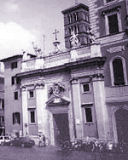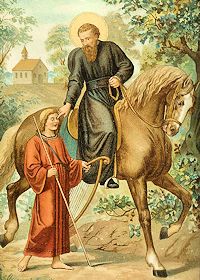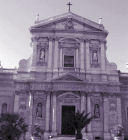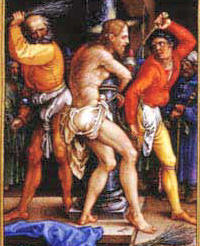Lent: March 26th
Thursday of the Fourth Week of Lent
Other Commemorations: St. Ludger, Bishop (RM)
» Enjoy our Liturgical Seasons series of e-books!
Guided by the teachings of the Church through its admirable liturgy and the interior action of the Holy Spirit, souls ought to penetrate, to feel and almost to live, during these holy days, the unutterable sufferings of Jesus, immense as man's iniquity, the justice of God, and the love of His Heart. Souls ought to venerate and love that purity which impelled by divine love, is transformed into inconceivable pain for blotting out the sins of the world. —Liturgical Preludes, Most Reverend Luis M. Martinez, D.D.
A Year to Bear Fruit
Lent is the time for us to realize that we are dust and unto dust we shall return. It is the time to heed Jesus' call to "turn away from sin and be faithful to the Gospel." Jesus' words in the Gospel today bring us, therefore, to the heart of Lent. They remind us that every day we have is a gift from the Lord, but that gift also leads to a task, to bear fruit through a life of faith. They call us to examine our lives honestly and ask if we have been squandering or investing the blessings God has given us — of good health, of talents, of material resources, of life itself. In various parables and with different images — from both the financial (the parable of the talents) and the agricultural worlds — the Lord reminds us that he expects us to bear dividends and that we will be judged on the fruit that we bear. The image in today's Gospel makes it clear that we need to do this examination URGENTLY, because God will not wait forever for us to do what he created and called us to do. The Lord, who began this Lent by marking us with ashes and telling us, "Repent and believe in the Gospel," says to us with urgency as he said to his contemporaries after some local disasters, "I tell you, unless you repent, you will all perish." We don't want to perish. Jesus doesn't want us to perish and died so that we wouldn't have to. . . More
— Fr. Roger J. Landry

The Station is at the church of Saints Sylvester and Martin, which is one of the most venerable in Rome. It was originally built by Pope St. Sylvester, and still bears his name: but in the sixth century, it was consecrated to St. Martin of Tours. In the seventh century, it was enriched with the relics of Pope Saint Martin, which were brought from Chersonesus, where he had died a martyr a few years before. This church was the first Title of St. Charles Borromeo. It was also that of the learned liturgiologist, the Blessed Joseph-Mary Tommasi, whose body is now venerated in this church, and has been miraculously preserved, even to this day, in a state of incorruption.
St. Ludger
 St. Ludger was born in Friesland about the year 743. His father, a nobleman of the first rank, at the child's own request, committed him very young to the care of St. Gregory, the disciple of St. Boniface, and his successors in the government of the see of Utrecht. Gregory educated him in his monastery and gave him the clerical tonsure. Ludger, desirous of further improvement, passed over into England and spent four years and a half under Alcuin, who was rector of a famous school at York.
St. Ludger was born in Friesland about the year 743. His father, a nobleman of the first rank, at the child's own request, committed him very young to the care of St. Gregory, the disciple of St. Boniface, and his successors in the government of the see of Utrecht. Gregory educated him in his monastery and gave him the clerical tonsure. Ludger, desirous of further improvement, passed over into England and spent four years and a half under Alcuin, who was rector of a famous school at York.
In 773 he returned home, and St. Gregory dying in 776, his successor, Alberic, compelled our Saint to receive the holy order of priesthood and employed him for several years in preaching the Word of God in Friesland, where he converted great numbers, founded several monasteries, and built many churches.
The pagan Saxons ravaging the country, Ludger traveled to Rome to consult Pope Adrian II, what course to take, and what he thought God required of him. He then retired for three years and a half to Monte Casino, where he wore the habit of the Order and conformed to the practice of the rule during his stay, but made no religious vows.
In 787, Charlemagne overcame the Saxons and conquered Friesland and the coast of the Germanic Ocean as far as Denmark. Ludger, hearing this, returned into East Friesland, where he converted the Saxons to the Faith, as he also did the province of Westphalia. He founded the monastery of Werden, twenty-nine miles from Cologne.
In 802, Hildebald, Archbishop of Cologne, not regarding his strenuous resistance, ordained him Bishop of Munster. He joined in his diocese five cantons of Friesland which he had converted and also founded the monastery of Helmstad in the duchy of Brunswick.
Being accused to the Emperor Charlemagne of wasting his income and neglecting the embellishment of churches, this prince ordered him to appear at court. The morning after his arrival the emperor's chamberlain brought him word that his attendance was required. The Saint, being then at his prayers, told the officer that he would follow him as soon as he had finished them. He was sent for three several times before he was ready, which the courtiers represented as contempt of his Majesty, and the emperor, with some emotion, asked him why he had made him wait so long, though he had sent for him so often. The bishop answered that though he had the most profound respect for his Majesty, yet God was infinitely above him; that whilst we are occupied with Him, it is our duty to forget everything else. This answer made such an impression on the emperor that he dismissed him with honor and disgraced his accusers.
St. Ludger was favored with the gifts of miracles and prophecy. His last sickness, though violent, did not hinder him from continuing his functions to the very last day of his life, which was Passion Sunday, on which day he preached very early in the morning, said Mass towards nine, and preached again before night, foretelling to those that were about him that he should die the following night, and fixing upon the place in his monastery of Werden where he chose to be interred.
He died accordingly on the 26th of March, at midnight.
—Excerpted from Lives of the Saints, by Alban Butler, Benziger Bros. ed. [1894]
Patronage: Groningen, Deventer, East Frisia, Roman Catholic Diocese of Münster, Essen-Werden
Highlights and Things to Do:
- Read more about St. Ludger at EWTN.
- Visit CatholicIreland.net for more information about St. Ludger

Saturday in the Third Week of Lent
Station with Santa Susanna (St. Susan):
The Station is in the church of St. Susanna, virgin and martyr of Rome. The first Christian place of worship was built here in the 4th century. It was probably the titulus of Pope Caius (283-296). Caius was St. Susanna's uncle, and tradition claims that the church stands on the site of her martyrdom. The church is now the national parish of the United States since 1922.
There is a temporary closure (2022), and currently the substitute Station Church is S. Maria della Vittoria (St. Mary of Victory).
For further information on the Station Churches, see The Stational Church.








